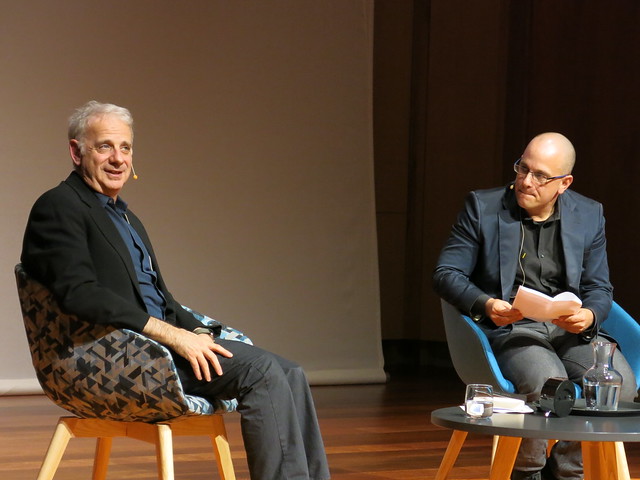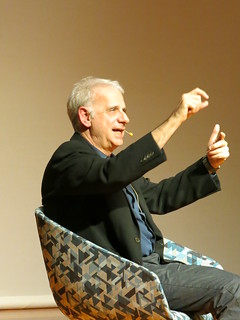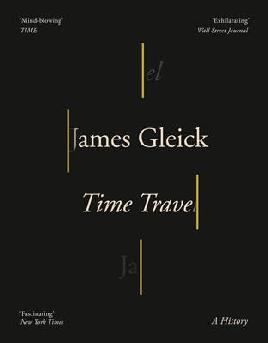James Gleick does not want to offend anyone.
The author of numerous books of a scientific bent is careful with his words and keen not to ruffle any feathers. It's speculation on my part, but I wonder if his experience is that, on the topic of Time Travel, passions might sometimes become inflamed?
A curious full house gather at the Piano for this WORD Christchurch session featuring Gleick and fellow New Yorker Daniel Bernardi (erskine fellow, film and media studies scholar, science fiction expert and documentary filmmaker). They discuss the ins and outs, twists, turns and paradoxes of Time Travel. Before long there is, as is the new tradition when two educated Americans speak in the presence of non-Americans... a jocular swipe at the current US president.

Fortunately this science-loving audience is not in the least offended by the joke.
Gleick's book Time Travel: A history is an exploration of the literature, science and zeitgeist of Time Travel. It's far-ranging, smart and brain-expanding.
But what made him want to write on that topic in the first place?
I discovered this weird fact - that Time Travel is a new idea. That didn't make any sense to me.
Why did it take until H. G. Wells's novel The Time Machine for people to explore that as an idea? It seems a few things came together: photography and cinema were showing people a slice of the past in the present; instantaneous communication was suddenly possible making the lack of temporal alignment in different places more obvious; and time standards became a thing for the first time. As Gleick puts it, "the way people thought about Time was up for grabs".
Then Einstein came along and things got really interesting.
Though Einstein's theories allowed for the possibility of a sort of Time Travel, Gleick is quick to point out that it's not the punching-a-date-on-a-machine or opening-a-portal-to-another-era kind. It's really just the acknowledgement that there is no universal time. Everyone's experience of time is personal and given the right set of circumstances (speedlight travel, for instance) your version of time can slow down relative to everyone else's. This means that the Time Travel stories of the "Rip Van Winkle" (or Futurama) kind become technically possible. But Gleick doesn't believe the imaginary, sci-fi type Time Travel that continues to excite our imaginations exists, or that it will. Though he seems apologetic about it, as if he's mindful of deflating the aspirations of wannabe Time Travellers in the audience.
On the enduring appeal of Time Travel in literature and popular culture, Gleick feels that it lets people explore many things about families and relationships - it gives you the ability for "a do-over". Like the movie Groundhog Day. He points out that a lot of Time Travel stories are about fathers and mothers, families and parents.
Take Back to the Future - isn't this really just a movie about looking at your parents and realising they were once young like me, and wondering "what was that like?"
This is far from the only reference to Time Travel in popular culture, and many in the audience probably come away from this talk with a reading/watching list that includes:
- A Handmaid's Tale by Margaret Atwood - indicative of pessimism about the future of "our benighted country".
- Doomsday book - H. G. Wells never wrote about going into the past but Connie Willis does.
- "All you zombies" by Robert Heinlein - An early short story that became the movie Predestination and is an interesting example of The Grandfather Paradox.
- Looper - Movie that nicely skirts over the paradoxical plot difficulties by having Bruce Willis tell his younger self "If we're going to talk about Time Travel sh*t we're gonna be sitting here making diagrams with straws all day".
- Interstellar - Bernardi's pick as the film that best visualises the science of Time Travel.
- The Planet of the Apes series - Bernardi's favourite for its use of Time Travel to address issues of gender and race.
- Arrival - A film that Gleick feels works very well in performing a "subtle trick" on the audience. All Time Travel stories have to do this but in this film you barely notice it happening.
- Twelve Monkeys - Another Bruce Willis film that deals with a Time Travel loop and deals with a death.
- "Blink" - Gleick's favourite episode of Doctor Who, in particular a scene set in a spooky old house, "old houses are great time travel machines". It's also the first episode in which the phrase "timey-wimey" is used.

Gleick is at great pains to try and describe these stories in a way that does not reveal any important plot twists. In the case of Planet of the Apes this is... is adorable the right word? The movie came out in 1968. But no spoilers!
Another appealing aspect to Time Travel is that it's a way of escaping death. After all, (spoiler alert!) Time will kill us all in the end.
When we hear Time's winged chariot it's not delivering good news.
But what is Time (other than universally deadly)? Scientists may tell you that Time is the 4th dimension and that it's similar to the other physical dimensions in that we inhabit one spot and the rest stretches out away from us, both backward and forward. This rather flies in the face of what Gleick says we know "in our guts" about Time i.e. that the past has happened and the future hasn't.
It seems an oddly obvious statement to have to make, and Gleick says it's not a scientific one but a religious one.
Some of the audience questions delve into this idea of religious thought versus Time Travel and at this point I get lost, draw a spiral in my notebook and label it "loop of confusion". Questions like "is God in Time with us?" and "doesn't an interventionist God imply that the future isn't set?" do somewhat "screw my noodle". Given the heady topic, it seems inevitable that I lose the thread of the discussion at some point in proceedings. Perhaps it always has, and always did happen?
Other questions posed include one from my colleague Fee (who wrote her own post about James Gleick) and wonders if the future is set, then what about premonition? Which Gleick says (gently) that he does not believe in, though it's a powerful idea.
Another question asks how it is that Gleick can explain such scientifically complex stuff in ways that non-scientist folk can understand. He says simply that he's a journalist so he asks lots of questions and that a big part of it is just getting scientists to talk you as they sometimes "live in their own abstruse world".
I am lucky enough to get the last mic grab of the night and ask my own question (which if I could have a Time Travel do-over for, I would make slightly less waffley). It's with reference to the way we think about Time in terms of spatial metaphor. In the Western world we conceive of the past as being behind us and the future in front of us but in Māori culture this is flipped around - the past is known and therefore visible before you and it's the future that approaches you from behind. In the course of researching had he found any other cultures that view Time this way? Gleick replies that the language we use, the words that we use to describe Time really shape how we think about it and that in some Asian languages Time travels on an "up and down" axis or "right to left".
And if I thought my noodle was screwed before it definitely is now. As I exit the theatre along with the rest of the audience I concentrate on travelling forward through space and backwards/forwards/vertically through time.
More information
- Find titles by James Gleick
- Find titles about Time Travel
- Time: The real history of science fiction - BBC programme that discusses several of the films discussed in this session as well as the Grandfather paradox and other Time Travel tropes. (log in with your library card number and PIN to watch online)
- More photos from WORD Christchurch Autumn Season 2017




Add a comment to: James Gleick at WORD Christchurch: No spoilers for Time Travellers